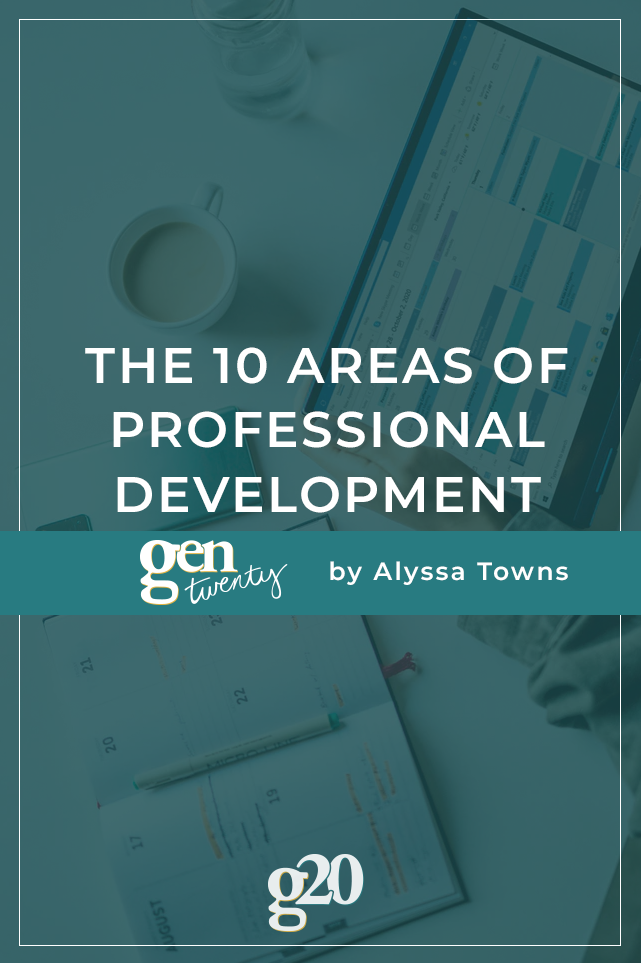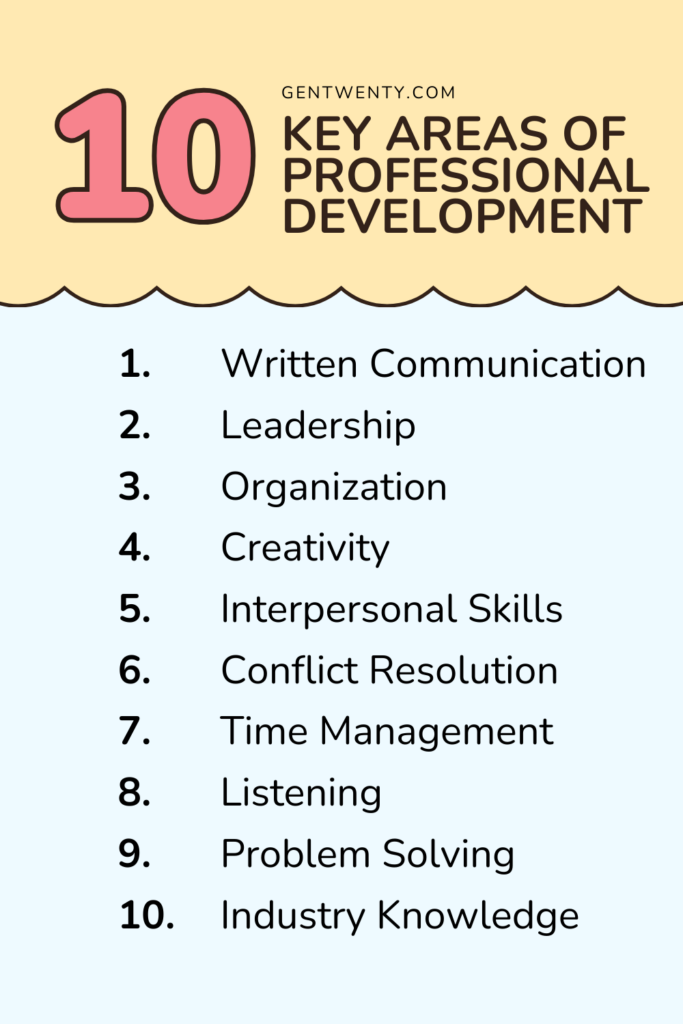These are the 10 areas of professional development to focus on when it comes to career growth. If you’re stuck in your career, these will move you forward!
Let’s face it: professional development is crucial to you as an individual and your employer or business if you’re an entrepreneur.
No matter what profession you’re in, the growth potential is limitless over time, no matter how many years of experience you have under your belt.
There are always areas worth diving into and improving your skill sets in, especially with the changing nature of work due to technological advancements. In this blog post, we’ll cover the 10 areas of professional development that are most important.
Continued professional development allows you to stay up-to-date with the changing nature of the world, learn new skills, and adapt to changes within your industry, and can help you earn more money.
According to Forbes, employers benefit from investing in employees’ professional development, including combatting skills shortages, staying up-to-date with industry trends, increasing employee engagement, reducing turnover, aiding in succession planning, and attracting better talent overall.
Professional development is a win-win situation overall.

10 Key Areas of Professional Development For Growth
If you’re ready to pursue professional development in your career and aren’t sure where to get started, here are ten areas worth exploring:
- Written Communication
- Leadership
- Organization
- Creativity
- Interpersonal Skills
- Conflict Resolution
- Time Management
- Listening
- Problem Solving
- Industry Knowledge
Now, we will dive deeper into what each of these looks like in a professional setting as well as explore some specific goal examples you can work towards within each area.
1. Written Communication
Written communication skills are necessary every day, whether you’re writing emails, chatting with others through instant messaging tools, posting on social media for your business, or completing a project.
In professional settings, conveying information accurately and clearly is essential. Effective written communication ensures that messages are understood without ambiguity or confusion, minimizing the potential for misunderstandings or errors.
Keep clarity and conciseness as your end goals in mind. If you struggle with written communication, consider investing time learning about grammar, tone, punctuation, and eliminating fluff. There are many free tools to help you improve your writing as well, such as Grammarly, for example.
If you want to take your professional development to the next level, consider professional development training courses to improve both your skills and your professionalism. It will take you far in your career to invest in this.
Here are 10 written communication goals to improve upon as you work on your professional development:
- Clarity: Aim to express ideas and information clearly and succinctly, ensuring that your message is easily understood by your audience.
- Conciseness: Strive to convey your message in the most efficient manner possible, avoiding unnecessary verbosity or redundancy.
- Accuracy: Ensure that your written communication is free from grammatical errors, spelling mistakes, and inaccuracies to maintain credibility and professionalism.
- Audience Awareness: Tailor your writing style, tone, and content to suit the preferences and expectations of your intended audience, whether they are colleagues, clients, or stakeholders.
- Purposeful Communication: Define clear objectives for your written communication, whether it’s informing, persuading, instructing, or collaborating, and ensure that your message aligns with these goals.
- Adaptability: Be able to adapt your writing style and tone to different contexts, such as formal business correspondence, casual emails, or technical documentation, as needed.
- Empathy: Demonstrate empathy and understanding in your written communication, acknowledging the perspectives and emotions of your audience and responding appropriately.
- Feedback Solicitation: Encourage feedback on your written communication from peers, mentors, or supervisors to identify areas for improvement and refine your skills continuously.
- Continuous Learning: Commit to ongoing learning and development in areas such as grammar, punctuation, vocabulary, and writing techniques to enhance your written communication proficiency continually.
- Professionalism: Maintain a high standard of professionalism in your written communication, reflecting positively on yourself and your organization through your language, tone, and presentation.
By setting and actively working towards these written communication goals, professionals can improve their effectiveness, credibility, and impact in their professional interactions and endeavors.

2. Leadership
Leadership is a pivotal aspect of professional development as it cultivates crucial skills for guiding teams, making strategic decisions, and fostering innovation. Effective leadership inspires trust, motivates others, and drives organizational success.
Investing in leadership development enhances communication, decision-making, and conflict resolution abilities, preparing individuals to navigate challenges and seize opportunities in dynamic work environments.
Moreover, strong leadership fosters a culture of collaboration, accountability, and continuous improvement, empowering individuals to lead by example and influence positive change within their teams and organizations.
Needless to say, whether you’re a junior-level employee, a mid-level manager, a CEO, or any level in between, having strong leadership skills is a great area to focus on improving.
Leadership training helps instill individuals with more confidence, leads to higher-level opportunities and positions in many instances, and is undeniably beneficial to organizations. Leadership skills can be challenging to teach and develop over time. Still, you can take steps toward improving your leadership skills today by asking for more responsibility or becoming a leader outside of work by volunteering, for example.
Ultimately, prioritizing leadership development equips professionals with the tools and mindset to thrive in leadership roles and drive impactful outcomes.
Here are 5 leadership goal ideas to improve your professional development:
- Effective Communication: Enhance your ability to communicate clearly, confidently, and persuasively with team members, colleagues, and stakeholders. Focus on active listening, empathy, and adaptability to ensure that your messages resonate and inspire action.
- Strategic Thinking: Develop strategic thinking skills to anticipate trends, identify opportunities, and make informed decisions that align with organizational goals. Foster a long-term perspective, analyze data critically, and prioritize initiatives that drive sustainable growth and innovation.
- Team Building and Collaboration: Cultivate a cohesive and high-performing team by fostering a culture of trust, collaboration, and accountability. Set goals for team development, provide constructive feedback, and empower individuals to leverage their strengths and contribute to collective success.
- Conflict Resolution and Negotiation: Strengthen your ability to navigate conflicts, resolve disputes, and negotiate win-win solutions in challenging situations. Practice active conflict management techniques, promote open dialogue, and seek mutually beneficial outcomes that preserve relationships and foster cooperation.
- Continuous Learning and Development: Commit to lifelong learning and self-improvement to stay agile and adaptive in a rapidly evolving professional landscape. Set goals for acquiring new skills, seeking feedback, and pursuing leadership development opportunities through workshops, courses, and mentorship programs.

3. Organization
Organizational skills will benefit you in your professional life and your personal life as well. Honing in on and improving your organizational skills can help you be more productive and efficient at work, saving you time and energy to put back into other projects.
To get started, consider findings methods to help you plan your day, whether that means creating a to-do list the night before or following a digital calendar planning routine. Another way to improve your organization skills is to organize your computer from your email inbox to your desktop. Declutter paperwork by digitizing everything!
Here are 5 organization goals to implement at work:
- Streamline Processes: Identify inefficiencies in workflows and streamline processes to eliminate bottlenecks and enhance productivity. Utilize automation tools, establish clear protocols, and encourage continuous improvement to optimize operations.
- Promote Open Communication: Foster a culture of transparency and open communication where employees feel comfortable sharing ideas, concerns, and feedback. Implement regular team meetings, establish channels for anonymous feedback, and actively listen to employee perspectives to promote engagement and collaboration.
- Encourage Professional Development: Invest in the growth and development of your employees by providing opportunities for training, skill-building, and career advancement. Offer mentorship programs, support continuing education initiatives, and recognize and reward achievements to foster a culture of learning and growth.
- Foster Collaboration and Teamwork: Encourage cross-functional collaboration and teamwork to leverage diverse perspectives and skills within the organization. Create opportunities for interdepartmental projects, establish collaborative spaces, and celebrate team achievements to strengthen bonds and enhance synergy.
- Prioritize Employee Well-being: Prioritize the well-being and work-life balance of your employees to enhance morale, engagement, and retention. Implement flexible work arrangements, promote wellness initiatives, and provide support resources for mental health and stress management to create a positive and supportive work environment.

4. Creativity
Creativity extends beyond coloring books and crafts at home! Creative thinking is a valuable skill to have for both day-to-day work and long-term visions in the workplace.
Creative thinking includes a mix of problem-solving skills, analytical thinking, and communication skills to help you share your idea or solution. One of the best ways to increase your creative thinking capabilities is continually exposing yourself to and trying new ways of approaching the same task or problem. Doing things differently and breaking out of workstyle patterns in a meaningful way can help you grow in this area.
Here are 5 ways to boost your creativity in the workplace:
- Encourage Experimentation and Risk-Taking: Create an environment where employees feel empowered to take risks and explore new ideas without fear of failure. Encourage experimentation by providing opportunities for brainstorming sessions, prototype development, and pilot projects.
- Promote Cross-Disciplinary Collaboration: Foster collaboration across different departments and disciplines to leverage diverse perspectives and expertise. Encourage employees from different backgrounds to work together on projects, share insights, and collaborate on problem-solving.
- Provide Time and Space for Creativity: Dedicate time and resources specifically for creative pursuits. Allow employees to allocate a portion of their workweek to brainstorming, exploring new concepts, or pursuing passion projects. Designate creative spaces within the workplace where employees can brainstorm and collaborate freely.
- Celebrate and Recognize Creativity: Acknowledge and celebrate creative contributions from employees. Recognize individuals or teams who come up with innovative solutions, think outside the box, or demonstrate creative thinking in their work. Celebrating creativity reinforces its value and encourages others to embrace it.
- Encourage Diverse Perspectives: Foster an inclusive environment that values and respects diverse perspectives. Encourage employees to share their unique viewpoints, experiences, and ideas. Embrace diversity of thought and create opportunities for constructive dialogue and exchange of ideas.

5. Interpersonal Skills
Interpersonal skills help us communicate and interact with one another, and when done well, these skills help us communicate more effectively.
Whether you work for an employer or work for yourself, managing and maintaining relationships successfully can help you stand out from the crowd and get your job done well. You can work on your interpersonal skills by being mindful of your nonverbal communication cues, expressing a genuine interest in your colleagues’ or clients’ lives to build relationships, and practicing empathy.
Improving interpersonal skills at work is crucial for building strong relationships, fostering collaboration, and enhancing productivity. Here are five specific ways to achieve this:
- Active Listening: Practice active listening by focusing on the speaker, maintaining eye contact, and avoiding interruptions. Demonstrate empathy by acknowledging and validating the speaker’s feelings and perspectives. Paraphrase and summarize to ensure understanding and show that you value their input.
- Empathy and Emotional Intelligence: Develop empathy and emotional intelligence to understand and relate to the emotions and experiences of others. Practice perspective-taking, put yourself in others’ shoes, and consider their feelings and needs. Respond empathetically and tactfully, even in difficult situations, to build trust and rapport.
- Networking and Relationship Building: Invest time in networking and relationship-building activities to expand your professional network and cultivate meaningful connections. Attend industry events, participate in professional associations, and engage in informal interactions with colleagues. Foster genuine relationships based on mutual respect, trust, and support.

6. Conflict Resolution
Healthy conflict resolutions are necessary for all work environments, whether you work on a team, interact with clients, or both. Conflicts and disagreements are bound to happen and are a healthy and necessary part of working with others when handled appropriately.
Successful conflict resolution depends on your ability to be an active listener, engage in open communication, and control your emotions while expressing your feelings. Taking steps towards individual self-awareness is an ideal starting point when focusing on improving in this area.
How to work on your conflict resolution skills in the workplace:
Conflict resolution involves a series of steps aimed at addressing disagreements and resolving conflicts in a constructive and mutually beneficial manner.
Firstly, it’s essential to acknowledge the conflict and recognize the parties involved, along with their perspectives and interests.
Next, create a conducive environment for dialogue by ensuring privacy, neutrality, and respect. Encourage open communication, active listening, and the expression of thoughts and feelings without judgment.
Identify the underlying issues contributing to the conflict by asking clarifying questions and seeking to understand each party’s concerns. Collaboratively brainstorm potential solutions and alternatives while considering the interests and needs of all parties involved.
Evaluate the proposed solutions based on feasibility, fairness, and effectiveness. Negotiate and compromise as needed to reach a mutually acceptable resolution.
Finally, document the agreed-upon resolution and follow up to ensure compliance and address any remaining concerns or issues.
Conflict resolution requires patience, empathy, and a willingness to find common ground, ultimately fostering stronger relationships and a more harmonious work environment.

7. Time Management
Much like organizational skills, time management skills prove to be beneficial professionally and personally. The better you manage your time, the more effectively you’ll be able to meet deadlines, manage your workload, and keep your stress levels down.
One of the best ways to improve your time management skills is to obtain an in-depth understanding of how you’re spending your time. Track your days and the amount of time you spend completing various tasks first. Look for tasks that you might be able to delegate, understand when you procrastinate, and lean on tools to help you prioritize your workload.
Here are 5 ways to improve your time management skills at work:
Improving time management skills at work is essential for maximizing productivity and efficiency. Here are five concrete ways to achieve this:
- Prioritize Tasks: Start by identifying and prioritizing tasks based on their importance and urgency. Use techniques like the Eisenhower Matrix to categorize tasks into four quadrants: urgent and important, important but not urgent, urgent but not important, and neither urgent nor important. Focus on completing tasks in the first quadrant first, followed by those in the second quadrant.
- Set SMART Goals: Establish Specific, Measurable, Achievable, Relevant, and Time-bound (SMART) goals to provide clear direction and motivation. Break down larger tasks into smaller, manageable steps, and set deadlines for each step to maintain momentum and accountability.
- Use Time Management Tools: Take advantage of time management tools and techniques to organize your workload and track your progress. Utilize digital calendars, task management apps, and to-do lists to plan and schedule your activities effectively. Set reminders and alarms to stay on track and avoid procrastination.
- Minimize Distractions: Identify and minimize potential distractions in your work environment to maintain focus and concentration. Turn off notifications, set designated periods for checking emails and messages, and establish boundaries to minimize interruptions. Create a dedicated workspace free from clutter and noise to promote productivity.
- Practice Time Blocking: Implement time blocking techniques to allocate specific time slots for different tasks and activities throughout the day. Schedule blocks of uninterrupted time for focused work, meetings, breaks, and personal activities. Stick to your schedule as much as possible, but remain flexible to accommodate unexpected changes or priorities.

8. Listening
Have you ever listened to someone speak only to realize you weren’t paying attention to what they were saying? Don’t worry, friend, me too.
In contrast, active listening refers to the ability to listen to someone completely, understand what they’re saying, and comprehend their message so that you can recall what they said later. This soft skill will help you increase your value professionally, and comes with many benefits, including connection-building, instilling trust from others, and improving your knowledgebase and understanding.
Improve your active listening skills by making eye contact, learning how to paraphrase what you just heard, identifying nonverbal cues, and being open to others’ messages without judgment, to name a few.
Improving listening skills at work is crucial for effective communication, collaboration, and relationship-building.
Here are some ways to enhance listening skills:
- Practice Active Listening: Focus fully on the speaker and pay attention to both verbal and nonverbal cues. Maintain eye contact, nod occasionally, and avoid interrupting. Demonstrate interest and engagement by paraphrasing and summarizing key points to ensure understanding.
- Be Present and Mindful: Stay present in the moment and avoid distractions such as multitasking or thinking about your response while the other person is speaking. Practice mindfulness techniques to cultivate awareness and concentration during conversations.
- Show Empathy and Understanding: Put yourself in the speaker’s shoes and try to understand their perspective, emotions, and underlying needs. Show empathy by acknowledging their feelings and validating their experiences without judgment.
- Ask Clarifying Questions: Seek clarification when needed by asking open-ended questions or requesting further explanation. Avoid making assumptions or jumping to conclusions, and strive to understand the speaker’s intentions and motivations.
- Practice Reflective Listening: Reflect back what you’ve heard to confirm understanding and show that you’re actively listening. Paraphrase the speaker’s words and feelings to demonstrate empathy and ensure that you’ve accurately interpreted their message.
- Seek Feedback and Self-Reflection: Solicit feedback from colleagues, mentors, or supervisors on your listening skills and areas for improvement. Reflect on your listening habits and behaviors, and identify opportunities to enhance your listening skills through continuous learning and practice.
By incorporating these strategies into your daily interactions, you can improve your listening skills, foster stronger relationships, and enhance communication effectiveness in the workplace.

9. Problem Solving
No matter what industry you know, problems are bound to arise in your job. It’s important to understand that tribulations aren’t always negative, and developing problem-solving skills will allow you to identify issues, evaluate possible solutions, and choose the best solution to implement.
Solving problems quickly when they arise is a great way to set yourself apart from others. Building problem-solving skills takes practice and patience. Consider exposing yourself to new challenges by asking to partake in a project you’re less experienced in, or identify a problem in your current day-to-day workload and identify a variety of solutions that may help solve it.
Here are 3 ways to work on your problem solving skills:
Improving problem-solving skills at work is crucial for overcoming challenges and driving innovation. Here are three effective ways to enhance these skills:
- Practice Critical Thinking: Develop your critical thinking abilities by analyzing problems systematically, identifying root causes, and evaluating potential solutions. Ask probing questions, gather relevant information, and consider multiple perspectives before making decisions. Engage in exercises or puzzles that require logical reasoning and creative problem-solving to sharpen your analytical skills.
- Seek Learning Opportunities: Continuously seek opportunities to expand your knowledge and expertise in areas relevant to your role. Attend workshops, seminars, or online courses focused on problem-solving techniques, decision-making frameworks, and innovation strategies. Learn from past experiences and case studies to gain insights into effective problem-solving approaches and apply them to current challenges.
- Collaborate and Brainstorm: Foster a collaborative work environment where team members can come together to brainstorm ideas, share insights, and pool their expertise to solve complex problems. Encourage diverse perspectives and constructive debate to stimulate creativity and innovation. Utilize techniques such as brainstorming, mind mapping, or the Delphi method to generate and evaluate potential solutions collaboratively.
10. Industry Knowledge
Knowledge truly is power! This area seems like an obvious one, but it may get left in the dust when workloads are packed full. Level up in your industry by taking online courses about a relevant topic, or reach out to a colleague or mentor to see if you can set up a knowledge share to swap information.
Be sure to continuously prioritize time to catch up on the latest industry news, especially if you work in an industry that’s always evolving, such as digital marketing, for example.
Here are 5 concrete ways to stay up to date on industry knowledge:
- Read Industry Publications and News: Stay updated with industry news, trends, and insights by regularly reading relevant publications, journals, blogs, and news websites. Subscribe to industry newsletters, follow influential thought leaders on social media, and participate in online forums or discussion groups to stay informed about the latest developments.
- Attend Conferences and Networking Events: Attend industry conferences, seminars, workshops, and networking events to connect with peers, experts, and professionals in your field. Take advantage of opportunities to learn from keynote speakers, participate in panel discussions, and engage in knowledge-sharing sessions to gain valuable insights and perspectives.
- Participate in Continuing Education: Enroll in professional development courses, webinars, or online training programs offered by reputable institutions, professional associations, or industry organizations. Invest in certifications, workshops, or specialized training courses to enhance your skills and knowledge in specific areas relevant to your industry.
- Join Professional Associations: Become a member of relevant professional associations or industry-specific groups to access resources, networking opportunities, and educational events. Participate in committees, task forces, or special interest groups to collaborate with peers, contribute to industry initiatives, and stay abreast of industry trends and developments.
- Seek Mentorship and Guidance: Identify mentors, advisors, or industry experts who can provide guidance, support, and insights based on their experience and expertise. Establish mentorship relationships, seek feedback, and leverage their knowledge and networks to broaden your understanding of the industry and navigate career challenges effectively.



Final Thoughts on These 10 Key Areas of Professional Development
These are the 10 areas of professional development to focus on when it comes to career growth. If you’re stuck in your career, these will move you forward along with a professional development plan designed just for you and your career path. Whether you need to improve on your hard skills or soft skills, these areas are worth focusing on.
Professional development is not merely a one-time endeavor but a lifelong journey of growth, learning, and adaptation. As the workplace landscape continues to evolve, individuals must embrace opportunities for self-improvement, skill enhancement, and career advancement. It’s important to pursue professional development opportunities on a regular basis both for learning experiences and job satisfaction.
Whether through formal education, on-the-job training, or personal development initiatives, investing in professional growth empowers individuals to unlock their full potential, achieve their goals, and thrive in their chosen fields. Moreover, prioritizing professional development fosters a culture of continuous improvement within organizations, driving innovation, productivity, and employee engagement.
By cultivating a mindset of curiosity, resilience, and lifelong learning, professionals can navigate challenges, seize opportunities, and stay relevant in an increasingly competitive global economy.
As we embrace the future of work, let us commit to embracing professional development as a cornerstone of success, both individually and collectively. Together, let us embark on this journey of growth, equipped with the knowledge, skills, and determination to shape our careers and make meaningful contributions to the world around us.
More Career Posts You’ll Like:
- 12 Ultra-Inspiring Examples of Long Term Career Goals
- The 15 Best Books For Career Development To Advance
- 20 Best Careers For A Virgo Woman
- 10 Non-Medical Careers In Healthcare
- 50 Ultra-Inspiring Quotes From Women Entrepreneurs
- 5 Must-Follow Tips To Make a Career Pivot… and The Best Free Job Site To Use
- 5 Easy Steps For Career Planning In Your Twenties
- 50 Examples and Ideas For Professional Development Goals
- 40 Epic Workplace Contest Ideas to Engage Your Team
- 25 Best Paying Part-Time Jobs for College Students For Extra Money
- 7 Ways for Young Professionals to Get Involved
- What to Do When You Have More Than One Passion
- Two Personality Tests All Job Seekers Need to Take
- 4 Creative Skills to Learn When You’re Ready to Grow Your Career
- 10 Keys to Joy and Success in Your Career
- 5 Tips for Building a Strong Career Foundation in Your Twenties
- The 10 Areas of Professional Development
- 12 Ultra-Inspiring Examples of Long Term Career Goals
